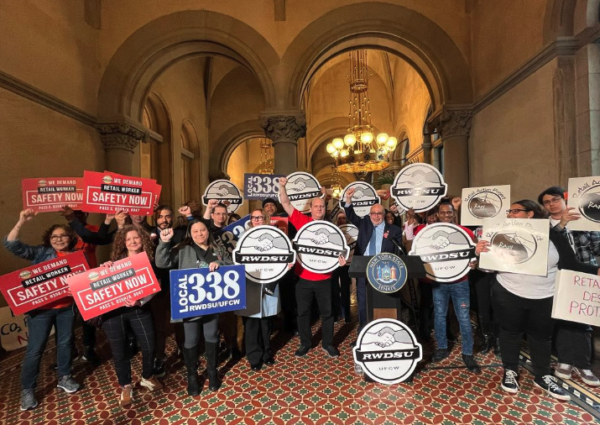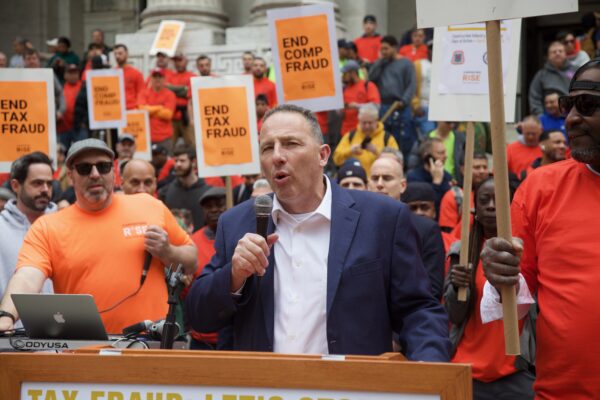New York, NY – Two months after a pair of hurricanes struck Puerto Rico with such sustained force that many there
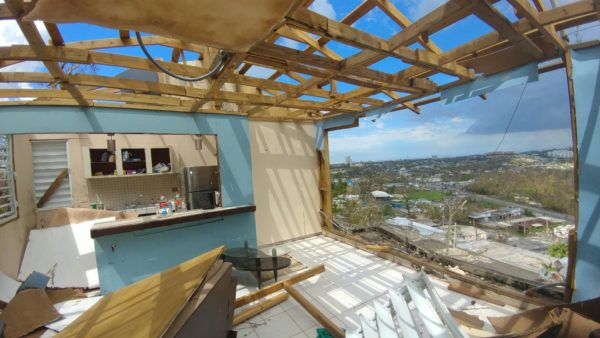
feared they would not survive — half the island’s population remains without power and union tradespeople who took part in disaster relief efforts say volunteers can hardly keep up the level of need thanks to the Trump administration’s initial sluggishness sending aid.
Earlier this week, Broadway star Lin-Manuel Miranda told the Associated Press that due to the “slowness of the initial response,” volunteers like him working with relief agencies in the aftermath of Hurricanes Irma and Maria, are struggling to adequately address Puerto Rico’s needs.
That analysis jibes with the first-hand account Teamsters Local 210’s Jessica Yance provided LaboPress on Monday.
Yance, a crane and other heavy equipment operator, was among the more than 200 unionists who last month packed a United Airlines flight to Puerto Rico, hoping to render as much aid to the stricken population as they possibly could.
“It was eye-opening to me and life-changing,” Yance said in an interview set to air on this Sunday night’s 9 o’clock episode of LaborPress’ Blue Collar Buzz. Being there and actually seeing people suffering — I felt like I was in a Third World country. Puerto Rico is supposed to be part of the States — so, that was very shocking to me. I feel they still need a lot of help. They didn’t get the help at the time that they needed it. It should have happened right there and then.”
Following on the heels of Hurricane Irma in early September, Hurricane Maria hit Puerto Rico a couple of weeks later with 155-mile per hour winds.
On Friday, Richard Ramos, executive director of the Puerto Rico Electric Power Agency quit under a cloud of suspicion after
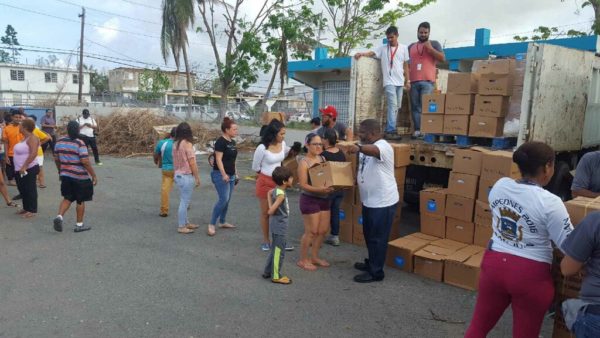
previously making it possible for a shady outfit with ties to the Trump administration to secure a contract to rebuild Puerto Rico’s decimated electric grid.
Yance spent two weeks in Puerto Rico working 14-hour days — from October 4 thru 18 — helping doctors, nurses and other trade unionists provide food, water and medicine to devastated towns all over the storm-ravaged island.
“When I got there, I felt like…we were, honestly, the only ones doing anything [to help],” the Teamster crane operator said. “I saw FEMA, but they were doing a lot of paperwork with the people of Puerto Rico. We were actually working for the people of Puerto Rico. We went door-to-door. I didn’t see people working on electricity…I didn’t see people working on the roads or anything like that.”
Teamsters Local 445 trucker Dan Maldonado also took part in last month’s disaster relief efforts. And according to him, the first time many hurricane victims encountered help, was when he and his fellow unionists arrived on the scene.
“To not see somebody for two or three weeks — [not] receive any help with water — to me, that speaks volumes,” Maldonado told LaborPress.
And while Donald Trump attempted to minimize the damage and suggested federal resources would soon have to be pulled out of Puerto Rico, many of the island’s children learned that their schools, in addition to their homes, were also gone, too.
“We went to schools, but the classrooms were used as apartments for people who lost their homes,” Yance said. “They had food, but not a lot. All the schools that I went to…they weren’t schools anymore — they were temporary shelters for people who lost all of their belongings.”
When Puerto Rican Teachers Federation VP Edwin Morales reached out to a supportive group of climate change activists in Brooklyn during the 5th anniversary of Superstorm Sandy — he described the situation in Puerto Rico this way: “We are fighting against the lack of response from FEMA and the federal agencies. And, also, we are dealing with
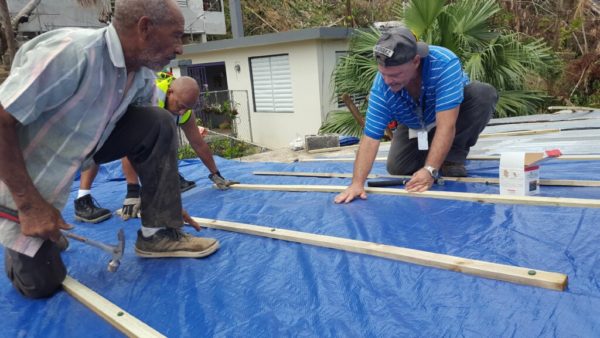
a lot politics that are trying to build misery.”
Many are intent of leaving Puerto Rico entirely. Estimates put the number of Puerto Ricans flowing to the mainline in the aftermath of Hurricanes Irma and Maria at more than 140,000 souls.
According to Yance, many more would like to leave immediately, but can’t find any flights off the island until January or February. Demand has also reportedly made tickets prohibitively expensive for many others.
As one resident told Yance, “My mom and my father think they are going to Florida to visit me… they don’t know they are not going to come back here.”
While Puerto Rico’s death toll officially remains unknown, as many as 500 people are feared dead as a result of September’s catastrophic storms.
Yance said that a lot of adult children who can secure flights out of Puerto Rico are “almost kidnapping their own parents because they’re very stubborn and they want to stay there, but it’s not safe.”
“A lot of [the people I met] were in shock,” the Local 210 member added. “This is what they said, ‘We love our island — but this…we felt with this one we were going to die. We go through hurricanes…but with this one we felt like we were going to die the way we heard the wind at our doors.’
“A lot of people cried,” Yance recalled. “A lot of people were in shock. And a lot of people…they don’t know how to restart the rebuilding. These people lost everything, so they have to start from scratch.”
“LaborPress’ “Blue Collar Buzz” airs every Sunday night from 9 to 10 p.m. on AM970 The Answer. Listen online at LaborPress.org, or check out the library of past episodes at www.am970theanswer.com.


